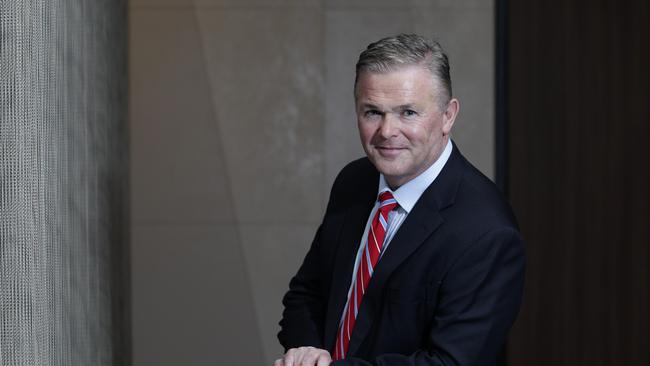Santos delays $8bn gas project as prices plunge
Santos has delayed development of its $US4.7bn ($8bn) Barossa gas project and slashed spending for 2020.

Santos has delayed development of its $US4.7bn ($8bn) Barossa gas project and slashed spending for 2020 after describing the plunge in oil prices and rout in markets from coronavirus as a “one-in-100-year event”.
The Barossa project was to be signed off by June, with gas from the field to supply the Darwin LNG plant. No new timeframe has been set for the development, while the Papua New Guinea expansion and Dorado oil project in Western Australia are also on ice until the market recovers.
“This is an event driven global downturn and it’s a one-in-100-year event,” Santos chief executive Kevin Gallagher told The Australian, referring to the combination of the pandemic roiling markets and savage drop in oil prices.
“What was a good plan just a few months ago we’ve obviously had to go and revisit. It’s a completely new environment, so we’ve taken all growth off the table and we’ll run a steady state production profile for the next five years.”
Santos plans to cut its spending this year by 38 per cent to $US550m, trim its production costs by $US50m and issued a target for 2020 free cash flow break-even oil price of $US25 a barrel, from $US29 a barrel last year. Some job cuts are also likely among workers employed on Barossa and its other growth projects, Mr Gallagher confirmed.
Oil has more than halved to just $US25 a barrel due to a supply pact dissolving between OPEC and Russia, piling pressure on energy companies who sanctioned projects and baked in prices at more than double those levels to justify new investment and spending.
With Oil Search and Santos announcing plans to reduce spending by 40 per cent this year, Woodside Petroleum is also working on a package of cost-cutting measures and potential project deferrals in response to the oil price crash, as Australian energy producers scramble to lighten their exposure in the event of a prolonged market rout.
The carnage continued on Monday, with Santos shares falling 4.3 per cent to $2.92, Oil Search plummeting 19.7 per cent to $1.88 and Woodside off 4.6 per cent to $15.27.
Woodside’s board is understood to be signing off a move to substantially reduce its planned investment after holding talks with its biggest shareholders last week, with an update expected to the market in the next few days.
The Perth producer’s BBB+ rating was placed on creditwatch negative by S&P on Monday after cuts to its oil price assumptions including $US30 a barrel crude for 2020.
“The creditwatch placement indicates a high likelihood of a downgrade in the next month or so if the company does not take adequate steps to preserve its financial profile, amid depressed oil and LNG markets and a significant capital expenditure pipeline,” S&P said.
Citi sees a temporary breach of its 30 per cent funds to debt ratio for 2020, troughing at 26 per cent. Dividends could be dumped in the 2021 financial year but it says the company remains robust.
Market ructions also saw a high-profile US shale producer collapse on Monday, while two of West Australia’s most promising energy juniors sparred in a takeover tussle.
The US shale producer Freedom Oil and Gas, backed by former BHP boss Mike Yeager, plunged into administration after failing to land a refinancing while West Australian junior Warrego Energy rejected a takeover attempt from joint venture partner Strike Energy.
Santos in December provided a $US25 a barrel break-even oil price target for 2025, which has now been brought forward to 2020 in response to market turmoil.
Still, the Santos chief remains confident the downturn will eventually pass and potentially even create another boom-like scenario given the number of projects now being deferred.
“I’m very confident once we get through this event will be a period of significant growth. It may take 12, 18 or 24 months but with the slashing of activity levels in the US and the deferral of major capital projects all over the world, in a couple of years time we’ll be talking about the shortfall,” Mr Gallagher said.
Some $US350m of Santos’ spending has been cut this year due to “rephasing” investment in Barossa and PNG LNG while the $US200m balance relates to the base business.
Santos has net debt of $US3.1bn, liquidity of $US3.1bn including $US1.2bn in cash and $US1.9bn in undrawn debt facilities.
Santos made the right call, analysts RBC said.
“We had assumed a little less capex trimmed than what has been announced this morning; however, we note recent further deterioration in oil markets. Ultimately, we think reducing capital expenditure is the prudent approach in such a challenged market,” RBC said.
And at the junior end the first takeover play has emerged since oil prices crashed: Strike Energy bid for Warrego Energy.




To join the conversation, please log in. Don't have an account? Register
Join the conversation, you are commenting as Logout